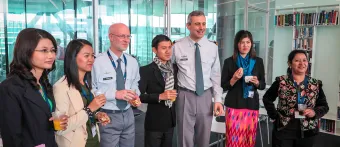Why does cultural diversity matter?

Why does cultural diversity matter?
Thursday, 21 May 2020, marks the United Nations’ World Day for Cultural Diversity for Dialogue and Development. This year raises the question: why does cultural diversity matter? Col (GS) Christian Bühlmann, GCSP’s Head of Diplomatic Dialogue, shares his experience of learning about and understanding cultural differences in order to succeed in his work.
In 2014, I was co-director of the New Issues in Security Courses (NISC) run by the GCSP. The participants, gender balanced, had come from all continents. One of their first tasks was to select two class representatives (a woman and a man). They decided to vote by a show of hands. Two candidates volunteered for the male class leader position: a diplomat from the Middle East and a legal adviser (LEGAD) from Scandinavia. Afterwards, the LEGAD explained me his perception of the election: “I could not vote for myself, as it is against my deepest principles,” he said, “thus, I voted for my challenger, expecting him to reciprocate.” What did the other candidate do? “He voted for himself and was elected.” At that time, lacking practical experience with cultural issues, we joked (shame on me!) that this was probably a failed understanding of democracy. But then a young diplomat from a Sub-Saharan Africa country came to us. “I would have selected the Swedish guy,” she said, “but as he was not confident enough to vote for himself, I had to choose the other one.”
Her reframing was a shock for me. Since that day, I have not perceived cultural relations the same way. Focused on my own ethics, I misperceived, as did every other participant in this short interaction, the hidden intercultural dynamics of this dialogue. I projected my local perceptions on a much richer and diverse setting and misjudged the diplomat and his actions. Yet, after that, and for the duration of the course, we all laughed about it as it was a perfect introduction to intercultural issues.
Observing diplomatic interactions from the perspective of the multilateral or bilateral diplomatic dialogues that the GCSP participates in, I am convinced that a better understanding of cultural differences is key to successful diplomatic dialogue.
Yet there is a whole list of do/do not activities that some books and coaches recommend. For instance, you should give your business card to a person from Asia while holding it with two hands and bowing. In Switzerland, when you receive a knife, you should give a coin in return as is the case in the Balkans as well. Men should not shake hands with a Muslim woman. But, as neat as they are, those recommendations are no more than a list, are too simplistic and, beyond their practical use, do not help in understanding different cultures. They resemble the superficiality of the Thomson and Thompson comics characters in Tintin, Belgian cartoonist Hergé’s masterwork, wearing a flamboyant folkloric costume in a failed attempt to blend in a foreign society.
Without entering the complex terrain of cultural studies, I would suggest, in an easy-going and practical setting, to focus part of your discussion on cultural differences. This is a perfect way to learn from and exchange ideas with your partners, to show an interest in their backgrounds and to get a deeper understanding of different topics. People are keen to explain their own culture and appreciate an attentive exchange in regard to their social and cultural norms. Meals are often a good place to start, as the cooking, serving and sharing of a meal are mirrors of deeper cultural aspects. It is always fascinating to compare an official lunch in Sri Lanka, where traditional curries are served in a manner deeply influenced by British etiquette, to Jordanian mansaf (lamb cooked in a yogurt sauce on rice), which you’re supposed to eat with the fingers of your right hand. This opens avenues to share historical, religious and societal aspects and to build deeper connections.
Understanding cultural diversity is key to dialogue and development. This World Day for Cultural Diversity for Dialogue and Development should remind us to integrate multiple cultural perspectives as a basis for better dialogue and development. Respecting other actors by better considering cultural diversity is a small step with high impact. If we stop looking at the world through our own cultural lens, a richer scope for negotiation emerges. It is an opportunity to solve issues by focusing on the greatest common denominator rather than the smallest commonalities.”
Discover more about the GCSP’s Diplomatic Dialogue offerings.
Disclaimer: The views, information and opinions expressed in the written publications are the authors’ own and do not necessarily reflect those shared by the Geneva Centre for Security Policy or its employees. The GCSP is not responsible for and may not always verify the accuracy of the information contained in the written publications submitted by a writer.
Christian Bühlmann is the Director, Centre Support and Development at the GCSP. He is seconded from the Swiss Armed Forces.
